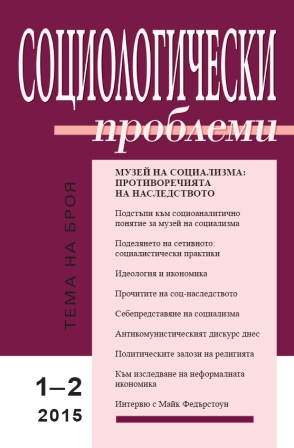Социалните науки в архивите на Държавна сигурност
The Social Sciences in the Archives of State Security
Author(s): Liliana DeyanovaSubject(s): Social Sciences
Published by: Институт по философия и социология при БАН
Keywords: field of power; State Security; autonomy of scientists; scientific field; “scientific ideology”; social networks; critique of archives.
Summary/Abstract: This article is part of a larger study on the changes in the field of Bulgarian social sciences after the 1960s and the years of the “thaw”; the author compares the public narratives of scholars (the anti-Stalinists, the “young generation”, the reformers) with the narratives contained in the archives of State Security (SS) (primarily Sixth Directorate of SS and the Cultural-Historical Intelligence). The article traces the forms of control, the non-autonomy of the scientific field and its relationships with various situations in the field of power. The author describes the specific constellations through which SS participated in the field of power that controlled the “metacapitals and the exchange rate of capitals between different fields” (P. Bourdieu). Similar to other researchers of the archives opened after the “revolutions of 1989” (S. Combe, J. Rowell, E. François), the author indicates “disappointment by the archives” of the political police. The study highlights the inner contradictions within SS, the tension arising between the different institutions, disciplines, generations, and groups, which formed strange unions, mobilized different “capitals”, including Party, nomenklatura-based, or international capitals, in order to attain a dominant position in the scientific field. The hypothesis is that these were real, not fake, transformations in the “totalitarian social sciences”; that the new scientific concepts, debates and university centres were not merely a result of the transformation of Marxist ideology or of political-ideological strategies pursued by the ruling Party and its closest assistants, the SS agents; that new “utopian segments” appeared within the ideology itself, but quickly turned into instruments of domination. This type of causality is hard to comprehend by those adherents of the so-called “totalitarian paradigm” who wonder whether the social sciences were only an ideological tool or, on the contrary, represented a resistance against the Marxist “scientific ideology”.
Journal: Социологически проблеми
- Issue Year: 47/2015
- Issue No: 1-2
- Page Range: 134-153
- Page Count: 20
- Content File-PDF

